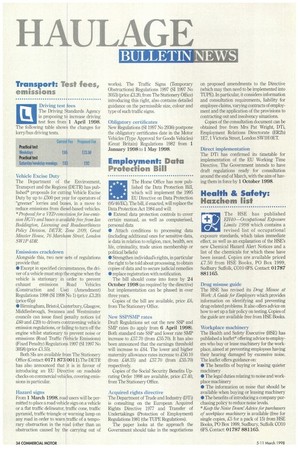Employment: Data Protection Bill
Page 36

If you've noticed an error in this article please click here to report it so we can fix it.
The Home Office has now published the Data Protection Bill, which will implement the 1995 EU Directive on Data Protection (95/46/EC). The bill, if enacted, will replace the Data Protection Act 1984 and will: • Extend data protection controls to cover certain manual, as well as computerised, personal data • Attach conditions to processing data (including additional ones for sensitive data, ie data in relation to religion, race, health, sex life, criminality, trade union membership or political beliefs) • Strengthen individual's rights, in particular the right to be told about processing, to obtain copies of data and to secure judicial remedies • replace registration with notification.
The bill should come into force by 24 October 1998 (as required by the directive) but implementation can be phased in over three years.
Copies of the bill are available, price £6, from The Stationery Office.
New SSP/SN1P rates
Draft Regulations set out the new SSP and SMP rates (to apply from 6 April 1998). Both standard rate SSP and lower rate SMP increase to £57.70 (from £55.70). It has also been announced that the earnings threshold will increase to £64. The lower and higher maternity allowance rates increase to £50.10 (from £4835) and £57.70 (from £55.70) respectively.
Copies of the Social Security Benefits Uprating Order 1998 are available, price £7.40, from The Stationery Office.
Acquired rights directive The Department of Trade and Industry (DTI) is consulting on the European Acquired Rights Directive 1977 and Transfer of Undertakings (Protection of Employment) Regulations 1981 (the TUPE Regulations).
The paper looks at the approach the Government should take in the negotiations on proposed amendments to the Directive (which may then need to be implemented into TUPE). In particular, it considers information and consultation requirements, liability for employee claims, varying contracts of employment and the application of the provisions to contracting out and insolvency situations.
Copies of the consultation document can be obtained free from Mrs Pat Wright, DTi, Employment Relations Directorate (ER2b) 1E7, 1 Victoria Street, London SiiV1H OET.
Direct implementation The DTI has confirmed its timetable for implementation of the EU Working Time Directive, The Government intends to have draft regulations ready for consultation around the end of March, with the aim of hav. ing them in force by 1 October 1998.




































































































































